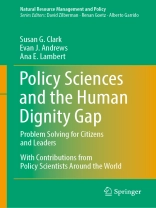This book presents a comprehensive and actionable framework for individuals and leaders seeking to promote human dignity within healthy environments. Rooted in the policy sciences approach, it equips readers with the essential concepts, tools, and skills necessary to address indignity and unhealthy conditions collectively.
Despite international commitments and domestic laws advocating for human dignity, a glaring ‘human dignity gap’ persists in numerous regions and problem contexts. This book sheds light on this disparity, examining its manifestations in global environmental change, development efforts, water insecurity, wildfires, human-wildlife conflict, access to public health, and much more. While existing scholarship often focuses on legal rights, the authors emphasize untapped opportunities for everyday citizens and leaders to foster human dignity within their communities and beyond.
By offering fresh perspectives, practical concepts, and exercises, this book empowers readers to bridge the performance gap, ultimately enabling the realization of human dignity from the grassroots level. It provides innovative strategies and frameworks to address this pressing global issue, making it an invaluable resource for scholars, policymakers, and concerned citizens alike.
Jadual kandungan
Chapter 1. Introduction: Human Dignity and Healthy Environments.- Part 1: Conceptualizing Human Dignity, Closing the Gap.- Chapter 2. Introducing the Human Dignity Gap.- Chapter 3. Living and Leading for Human Dignity.- Chapter 4. Systematic Thinking for Human Dignity.- Chapter 5. Knowledge of Dignity Concerns.- Chapter 6. Problem Orientation Understanding.- Chapter 7. Accounting for Social Dynamics.- Chapter 8. Connecting to Decision Making.- Part 2: Practicing Problem Solving for Human Dignity.- Chapter 9. Reflecting on Yourself and Others.- Chapter 10. Learning About Goal Values.- Chapter 11. Interactions and Communications.- Chapter 12. Influencing Decision-making.- Chapter 13. Understanding Institutions.- Chapter 14. Social Change.- Chapter 15. Improving Capacity and Agency.- Part 3: Illustrating Problem Solving for Human Dignity.- Chapter 16. Human Dignity and Ecological Identity: A Case by Norman Michael Kearney.- Chapter 17. Community Food Security as an Entry Point for Food System Change: A Case by David Pelletier.- Chapter 18. Enhancing Health Professionals’ Competencies to Support Breastfeeding Mothers in Quebec, Canada: A Case by Isabelle Michaud-létourneau, Jacqueline Wassef, Julie Lauzière, Laura Rosa Pascual, Marion Gayard, and Micheline Beaudry.- Chapter 19. Wildfire Risk and the Problem of Insurability: A Case by Matthew Auer.- Chapter 20. The Prospects for Ethnic Minorities in Southeast Asia: Using Policy Sciences to Avoid Analytic Pitfalls and Poor Policies: A Case by William Ascher.- Chapter 21. Reconciling Different Perspectives on the Ivory Trade in China: A Case by Yufang Gao and Susan G. Clark.- Chapter 22. Changing Education to Meet Today’s and Tomorrow’s Challenges: A Case by Richard L. Wallace.- Chapter 23. Conclusion: Citizenship and Leadership in Our Challenging Times.
Mengenai Pengarang
Susan G. Clark is Professor Emeritus at Yale University’s School of Forestry & Environmental Studies, USA. She is a Fellow at the Yale Institution for Social and Policy Studies. Clark is also a fellow in the World Academy of Art and Science and Science and Policy Advisor for Frontiers in Environment and Ecology, The Ecological Society of America. Her interests include interdisciplinary problem solving, decision making, governance, policy processes, leadership, conservation biology, organization theory and management, natural resources policy, and the policy sciences. She is currently teaching undergraduate and graduate courses on natural resource policy, problem solving, and grand strategy.
Evan J. Andrews is a Senior Research Fellow with Too BIG To Ignore: A Global Partnership for Small-Scale Fisheries Research (TBTI) and a postdoctoral fellow in the transnational research hub, Ocean Frontier Institute (OFI), based in the Department of Geography of Memorial University, Canada. He holds a Banting Postdoctoral Fellowship (2023-2025) and is a current member of the Executive Council for the Society of Policy Scientists. His interests lie in making change by understanding social-ecological change, including in coastal and marine systems, and advancing human dignity through effective policy processes and transdisciplinary collaborations. He is co-Principal Investigator of Moving Together for Marine Conservation (2022-2026) and the co-founder and network lead of TBTI Canada.
Ana Lambert is pursuing her Ph.D. in Human Geography at the University of Manchester, UK. Previously, she was the Latin America Program Manager for the Wildlife Conservation Society’s ‘Illegal Wildlife Trade’ program. Ana holds a Master of Environmental Management from the Yale School of Forestry & Environmental Studies and a B.S. in Environmental Engineering from Instituto Tecnologico y Estudios Superiores del Occidente (ITESO), Mexico. Shehas extensive academic and working experience in Latin America, the United States, Africa, and Australia, which spans the disciplines of social science, engineering, and wildlife conservation.












